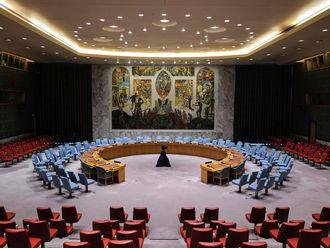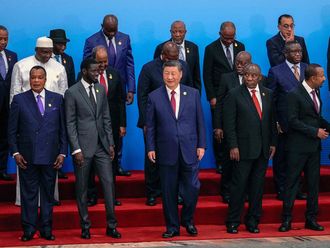Is Iran reverting to one of the late Shah's pet politics: an alliance between Shiites and Christians against the Sunnis and the Druze in Lebanon?
The question is not fanciful.
In a move that has surprised even the most seasoned observers of Lebanese politics, the Lebanese branch of the Hezbollah movement has just forged an alliance with the main Maronite political coalition in the parliament.
Shaikh Hassan Nasrallah, the Hezbollah leader, and General Michel Aoun, the Maronite standard-bearer, met in Beirut last week to give the alliance their seal of approval.
The idea of such an alliance has been gestating in Tehran, Damascus and Beirut for weeks, and was given the final boost it needed by Iran's President Mahmoud Ahmadinejad during his visit to Damascus last month.
Ahmadinejad considers Lebanon and Syria as part of Iran's glacis in its struggle against the United States and its regional allies, especially Israel.
He is, therefore, determined not to allow the US to bring veritable regime change in either nation.
Under the Shah, Iran considered Lebanon as part of its glacis against radical Arab regimes backed by the Soviet Union.
At that time, however, the Lebanese Shiite community was weak and disorganised. So the Shah based his Lebanon policy on the Maronite Christian community while the Sunnis and the Druze sided with radical pro-Soviet Arab regimes, including those in Damascus and Cairo.
Iran began organising the Lebanese Shiites soon after the 1958 Lebanese Civil War. Grand Ayatollah Borujerdi, then the Marjaa Taqlid (Source of Emulation) of the Shiite community, dispatched one of his brightest pupils, Moussa Sadr, to Lebanon for the purpose.
The Iranian government backed the enterprise with money and diplomatic support until the early 1970s.
On the Maronite side, Iran's chief interlocutor in Lebanon was former President Camille Chamoun, who was a frequent visitor to Tehran where he met the Shah and Prime Minister Amir Abbas Hoveyda.
The Iranian-backed alliance in Lebanon fell apart after the Khomeinist revolution in Tehran.
And Iran's view of the Maronites soured further when some of them, under Bechir Gemayel, forged an alliance with Israel while another group, led by Aoun, received money and arms from Saddam Hussain in Baghdad.
Many in Tehran must have worked hard at anger management to forget Aoun's close ties with Saddam Hussain throughout the 1980s when Iraq was at war with Iran.
But there is little sentiment in geo-strategy, and what matters for the present Iranian leadership is to contain the American advance in the Middle East until President George W. Bush is replaced by a more pliable adversary in Washington.
The beneficiaries
The strange alliance makes sense when we take into account the interests of those concerned. Aoun, who had fought and then fled the Syrians, makes his peace with Damascus.
And that enhances his hopes of replacing Emile Lahoud as Lebanon's president.
The Maronite community as a whole will benefit by keeping the present constitutional arrangements in place under which the Christians, who now account for some 23 per cent of the population, retain half the political power at national level.
Nasrallah benefits from the deal not only by proving his usefulness to Iran once again but also by breaking his party's political isolation inside Lebanon.
Outside Lebanon the chief beneficiary of the new alliance will be the Syrian government.
It can now be certain that the Lebanese opposition, now consisting mainly of the Sunnis and the Druze, will not have enough votes to impeach Emile Lahoud let alone appoint a new president who might be hostile towards Damascus.
The Lebanese government is now an auto-pilot at a time when the economic situation is steaming towards crisis point while the threat of political violence looms larger.
Can the Nasrallah-Aoun duo, backed by Tehran and Damascus, offer Lebanon the kind of political stability it needs to rebuild its sense of nationhood? No one could know for sure.
The alliance has taken Lebanese politics several steps back in time by putting the emphasis on sectarian rather than national strategies.
A majority of the Lebanese seem to favour policies that will end their nation's isolation and reintegrate it into the mainstream of global life.
The Hezbollah-Maronite alliance might not be able to offer an alternative vision if only because it must take into account the broader strategic interests of Iran and Syria.
By keeping the situation frozen in Lebanon, both Iran and Syria might wish to enhance their own protection against the threat of regime change.
But that could have an unexpected result: those interested in regime change might conclude that things in Lebanon will not change until they change in Syria and that, in turn, will not happen, until there is change in Iran.
All that could turn Lebanon into a regional battlefield, yet again. In the 1950s and then in the 70s and 80s, Lebanon paid a heavy price because international and regional powers fought their proxy wars in its territory.
And that is precisely what a majority of the Lebanese, including those supposedly represented by Aoun and Nasrallah, wish to avoid.
Iranian author Amir Taheri is a member of Benador Associates.











